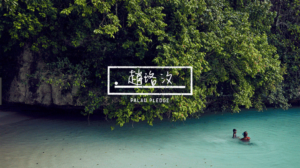Yesterday a whale died off the southern coast of Thailand. The autopsy revealed 80 plastic bags weighing up to eight kilos were found in the creature’s stomach. Thon Thamrongnawasawat, a marine biologist and lecturer at Kasetsart University, said the bags had made it impossible for the whale to eat any nutritional food. “If you have 80 plastic bags in your stomach, you die,” he bluntly explained.
Here’s another a chilling thought. A report by the World Economic Forum and the Ellen MacArthur Foundation estimates will be more plastic in the sea than fish by the year 2050. Meanwhile, in the Micronesian Island of Palau, tourists have been responsible for a wide range of environmental setbacks, from trashing the beaches and damaging its famous coral reefs and poaching the islands’ wildlife.
I guess the fundamental dilemma for island authorities is a simple one: how do they continue to welcome tourists while simultaneously protecting your nation from them? The answer came from Australian agency Host/Havas, was the ‘Palau Pledge’ which requires all the island nation’s visitors to sign — in their passports upon entry — an agreement not to make a mess.
While I think it is a shame it has come to this, the fix has no doubt been a masterstroke in effectiveness. The idea has already received global acclaim from activists while simultaneously winning one of the most sought-after awards in advertising: the D&AD Awards’ Black Pencil. The pledge itself, addressed to the children of Palau reads as follows:
Children of Palau,
I take this Pledge,
To preserve and protect your beautiful and unique island home.
I vow to tread lightly, act kindly, and explore mindfully.
I shall not take what is not given.
I shall not harm what does not harm me.
The only footprints I shall leave are those that will wash away.
Now about a pledge from every comms agency on the globe to donate 100 hours to fix an environmental problem of their choice?
